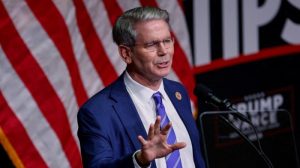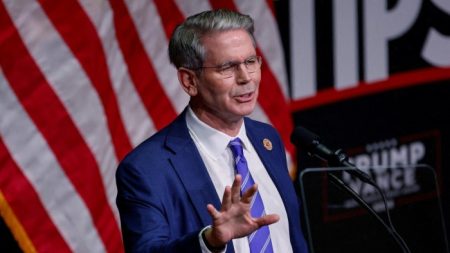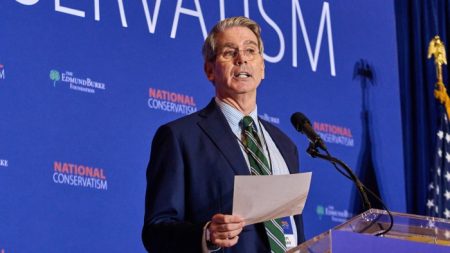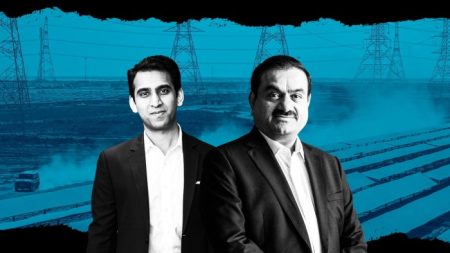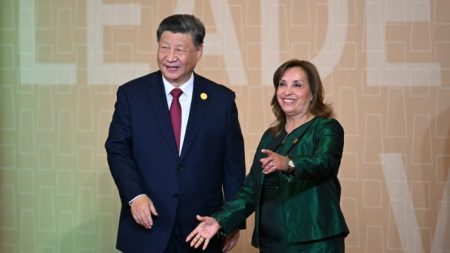Bill Ackman descended on downtown Omaha in early May for what UBS billed as a “special fireside chat”.
It was an opportunity to get Ackman and his partner Ryan Israel in front of the kinds of investors who had stuck with Warren Buffett for decades, investors who might be interested in the pair’s soon-to-be listed closed-end fund, Pershing Square USA.
The following day, Buffett himself would be taking the main stage across the street, with tens of thousands of Berkshire Hathaway shareholders — not to mention corporate chieftains including Citi’s Jane Fraser and Apple’s Tim Cook — flying in for the Oracle of Omaha’s annual general meeting.
An adoring crowd met Ackman at the UBS event. The billionaire would later say that he hoped to one day have an annual meeting in the same vein as Buffett’s: drawing large crowds and having the floor to wax on business and investment.
In characteristic boldness from Ackman, he planned to do it through one of the largest ever public listings — with plans to raise $25bn through Pershing Square USA — a lofty ambition for any company, let alone a fund whose structure has fallen out of favour with investors.
But the billionaire investor wanted to make Pershing Square USA a huge player in US capital markets. The fund could act as an anchor investor to another Pershing vehicle which would help companies like SpaceX and Stripe go public, while throwing its weight behind undervalued large-cap companies.
The public listing of the US vehicle was also part of a bigger scheme. It would be a precursor to an eventual blockbuster IPO of Ackman’s hedge fund — Pershing Square Capital Management, the entity that would manage his other funds — as soon as 2025, according to a person familiar with the plans.
Over the past week, that grand vision came crashing down.

Ackman pulled the IPO of Pershing Square USA on Wednesday after a startling series of setbacks, as the company slashed its fundraising target from $25bn, to $4bn, and then finally to $2bn — before yanking it entirely.
“I made the decision to withdraw the IPO this morning when I came up with a better transaction structure,” Ackman posted on social media platform X on Wednesday. “We were scheduled to price the offering this coming Monday, but we changed course this morning.”
As the IPO roadshow unfolded over the past three weeks, investors’ concerns started to emerge. Some worried that the initial $25bn target was far too large, and that the shares would trade at a discount after going public — similar to other closed-end funds, including Pershing Square’s own London and Amsterdam-listed entity.
The proposed listing was dealt a hammer blow last week when Ackman sent a letter to investors in his hedge fund, Pershing Square Capital Management, in which he said that the listing was on track to raise as much as 90 per cent less than originally anticipated.
“Bill is a once in a generation” talent, one equity investor in Ackman’s hedge fund said. But he added his “hyper honesty” about his tremendous fundraising aspirations proved to be his undoing. “The $25bn anchoring became so widely known that . . . if they only raised $2bn or $1bn everyone was going to say this is a failure,” he said.
Worse, Ackman acknowledged a number of investor concerns, including that the stock would not trade well after the IPO, saying that it required a “significant leap of faith” for investors to believe that the company would trade at a premium when “very few in history have done so”.
It was intended as a private email to partners, but his lawyers advised him that it had to be disclosed under SEC rules as part of the IPO process. The letter — and investors’ worries — spilled out into the open.
“I was shocked they did anything other than just pull it,” a senior banker at one of Pershing’s top underwriters said after the letter had been made public. “What a shitshow.”
The collapse of the public listing was presaged by the withdrawal of Boston-based hedge fund Baupost Group, which Ackman said in the letter had committed $150mn. After the letter was publicly disclosed, Baupost — whose chief executive Seth Klarman is notoriously private — decided against backing the listing.
As reports of Baupost’s decision to sit on the sidelines were made public, the air rapidly came out of the listing, and the banks leading the offering — a group that includes Citi, UBS, Bank of America and Jefferies — knew they had a problem. Anchor investors rarely drop out on the precipice of an IPO, which can sap demand from other would-be buyers.
Its public disclosure “slowed the momentum he had in the deal,” said David Erickson, a senior fellow at the Wharton School at the University of Pennsylvania and the former head of equity capital markets at Barclays.
“Sometimes following your bankers who have done lots of IPOs is probably the right way to approach it, as opposed to what’s always been successful for you,” he said, adding that the letter was “too much communication” and probably raised more concerns than it assuaged. “It’s a different process from raising private capital.”
Conversations with a dozen investors, capital allocators and bankers reveal that the IPO failed to create enough buzz in the institutional investor community. A sticking point among investors was the structure of the fund, which seemed to benefit Ackman but arguably did not reward early investors.
Pershing Square and Baupost declined to comment.
As a closed-end fund, the listing would be made up of permanent capital, meaning that it would be difficult for investors to redeem their shares at net asset value like a normal fund, instead forcing them to sell if they want to get their money back. The benefit would be that Ackman could hold stocks longer than a traditional hedge fund, without facing investor pressure to sell.
But such funds tend to trade at a discount to their net-asset value, which can disincentivise investors from placing stock orders before they go public.
Before the IPO fell apart, Ackman had been steadily rising in prominence. While he was always well-known on Wall Street, the social media celebrity he garnered in recent months propelled him to be known on Main Street, too. He told investors that his “notoriety” on social media would benefit the US listing.
After war broke out between Israel and Hamas in October last year, Ackman redirected his activist tactics — a skill he had honed for years as an investor — towards university presidents who he viewed as failing to do enough for Jewish students.

His lobbying efforts contributed to the resignation of Harvard University president Claudine Gay and University of Pennsylvania president Elizabeth Magill. His number of followers on X swelled.
As he courted controversy, he became increasingly convinced that his fame would boost his business dealings. The large discount between assets held by his Pershing Square Holdings vehicle seemed to be closing, with two people close to him arguing that his celebrity had driven investor interest to the fund.
There was some evidence of that. In June, he successfully sold a 10 per cent stake in his hedge fund Pershing Square Capital Management, which manages investments for his different vehicles, for $1.05bn. The deal attracted an eclectic group of investors, including San Francisco-based Iconiq Capital and Israeli insurance company Menora Mivtachim.
Still, some institutional investors were unconvinced. Since they could already get exposure to Ackman at a discount through Pershing Square Holdings, it made sense to wait and see how the US vehicle traded once it listed. They could potentially pick up shares later at a discount.
“The issue with a closed-end fund is that if it trades at a premium from IPO, then management tends to issue equity to deal with that excess demand,” said Kier Boley, the CIO of alternative investment solutions at Swiss private bank UBP. “But when sentiment turns and investors wish to exit, the fund trades at a discount and then tends to remain at this new discount range.”
Ackman is not finished yet. The billionaire is already working on a new vehicle to address investor concerns about how the US fund was structured. “He’s smart and creative so I’m sure there will be a workaround,” one banker involved in the deal said on Wednesday, shortly after the proposed listing was pulled.
While the US fund will not start trading in the coming week as planned, a cousin of that plan — something that “democratiz[es] access to the Pershing Square strategy” as Ackman once described the IPO — could emerge in a different form.
Ackman said in a video for investors on the roadshow this summer: “We hope someday 30 years from now people will be sitting at the Pershing Square USA shareholder meeting . . . and that their investment will have made a big difference for their family.”
Additional reporting by Ortenca Aliaj and Louis Ashworth
Read the full article here


